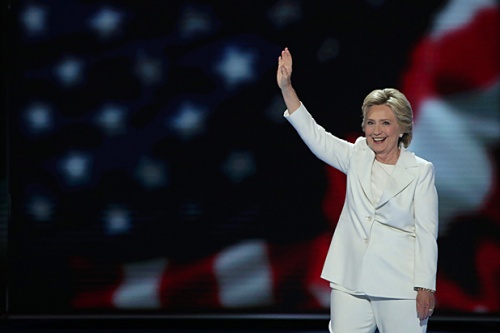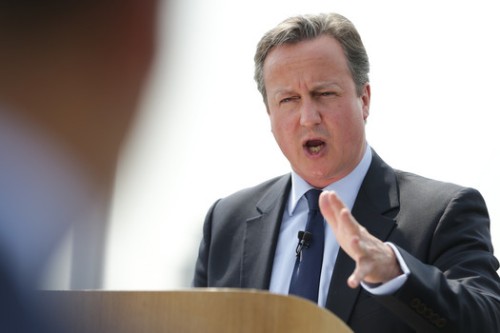Donald Trump has never made the status quo seem so refreshing
Elections tend to sharpen the contrasts between the parties and their candidates. Every four years as the vote in November approaches, from my perspective, it seems that the Republican presidential candidate – whether it’s Bob Dole, John McCain or Mitt Romney – has never looked so radically menacing. Maybe in the years before the race (and certainly after he lost and no longer had a claim to power), the prior Republican standard bearers occasionally appeared to be reasonable, measured and in the case of Dole and McCain even charming and funny.

This election cycle I have heard conservative commentators say that liberals are hyperventilating over Donald Trump and slapping him with the same outlandish labels just the way they do every presidential election cycle. Hadn’t we declared Romney (or George W. Bush for that matter) an enemy of the state a few short years ago, only now to look back on them charitably, if only to point out the new evil lurking? This year it’s Trump; in four years it may be someone like Paul Ryan receiving hyperbolic, rhetorical shade.
The fact is that Donald Trump is an entirely different beast.
As election day 2012 approached, I feared a Romney presidency would mean the loss of many of President Obama’s greatest achievements: the Affordable Care Act, Wall Street regulation, Marriage Equality, etc.
This year I fear that a Trump presidency would mean the loss of my (and my countrymen’s and women’s) basic constitutional rights and putting the nation that I love on the path toward a fascist dictatorship. How would the liberal constitutional order Madison crafted from Locke, the delicate checks and balances that Jefferson borrowed from Montesquieu and the democratic institutions (from the independent judiciary to the free press, to public universities to social welfare groups) that de Tocqueville so admired in American society hold up to the despotic torrent of a man who thinks that only he alone can fix what ails us?

I went back and looked at what invective I had thrown at Mitt Romney last time around. I found a column that I wrote on November 4, 2012, in which I charged that Mitt Romney’s policies would roll back the welfare state of the post-New Deal era and return us to another Gilded Age of low regulation and high concentrations of wealth. I approvingly paraphrased a critique that Barack Obama himself had used in the third presidential debate (which somehow we managed to survive that year as well) to the effect that Romney wanted to return to the foreign policy of the 1980’s, the social policies of the 1950’s and the economic policies of the 1920’s.
Last time around it seemed truly scary that despite his etch-a-sketch pivot in the general election, Romney was really beholden to the Tea Party conservative wing of his party.
 But compared with what Trump is expounding this election, Mitt Romney, even Ronald Reagan for that matter, looks like a saint. Previous presidential contests focused on the proper size and scope of government.
But compared with what Trump is expounding this election, Mitt Romney, even Ronald Reagan for that matter, looks like a saint. Previous presidential contests focused on the proper size and scope of government.
Now we have to contend with Trump’s:
- Muslim Ban
- Wall with Mexico
- Immigration deportation force and demonization or minorities
- Degradation of women – and desire to punish them for exercising their right to choose
- Tariff barriers that would likely crash trade and the market
- NATO abolition – or turning the organization into a protection racket
- Praise of Putin
- Re-tweeting of and failing to separate himself from white nationalist hate groups
- Unwillingness to abide by the outcome of the election and threat to the peaceful transfer of power
- Loosening of libel laws so he can sue the press for unfavorable news coverage
- Lack of understanding or respect for the separation of powers
- Encouragement of violence at his rallies
- Utter lack of respect for facts or truth, dark conspiracy theories and egomaniacal black soul

Here’s the thing: this is the first election in my lifetime when analogies to 1930’s Germany or the 1950’s Soviet Union don’t seem that farfetched. (See how I managed to avoid calling Trump “Hitler”?) A google search of “McCain” or “Romney” and “fascist” doesn’t turn up many hits, but try that search term with “Trump.”
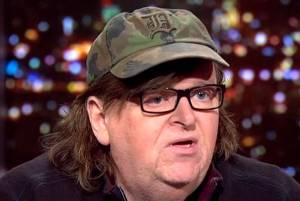 Left-wing documentarian Michael Moore and blogger and British-Tory turned Obama-progressive Andrew Sullivan both grouse that Trump has fashioned a winning argument that he is the agent of change (or as Moore call him, a “human Molotov cocktail”) against a gridlocked political system in Washington and the corrupt elites who run it. “It’s a rigged system, folks.” And Trump has explicitly run against Hillary Clinton as the embodiment of the political class – a person who has been in government for 30 years and done nothing to fix it because she is the problem.
Left-wing documentarian Michael Moore and blogger and British-Tory turned Obama-progressive Andrew Sullivan both grouse that Trump has fashioned a winning argument that he is the agent of change (or as Moore call him, a “human Molotov cocktail”) against a gridlocked political system in Washington and the corrupt elites who run it. “It’s a rigged system, folks.” And Trump has explicitly run against Hillary Clinton as the embodiment of the political class – a person who has been in government for 30 years and done nothing to fix it because she is the problem.
But a funny thing happened on the way to election day: the debates. We always have high hopes that the smart liberal – Walter Mondale, Michael Dukakis, Al Gore, John Kerry and Obama himself – will out-debate the Luddite conservative. Somehow in the past, even when the Democrat made the intellectual points, the Republican often proved more convincing to the electorate. Or the debates were interesting but failed to change the trajectory of the race.
the smart liberal – Walter Mondale, Michael Dukakis, Al Gore, John Kerry and Obama himself – will out-debate the Luddite conservative. Somehow in the past, even when the Democrat made the intellectual points, the Republican often proved more convincing to the electorate. Or the debates were interesting but failed to change the trajectory of the race.
Until this time.
Despite running for what many see as Obama’s third term with the fundamentals of the race against her, Hillary has (strategically) made the election a referendum on Trump – his lack of temperament, qualification and judgment to be president. She effectively prosecuted the case against him, showing him to be erratic, easily baited and utterly devoid of basic knowledge about government policy or the world in which we live. At the same time, she has presented herself as steady, assured, knowledgeable and extremely competent. I keep coming back to Mrs. Clinton’s biting statement in their first debate about Trump criticizing her for preparing for the encounter. To which she responded, “And you know what else I prepared for? I prepared to be president. And I think that’s a good thing.”
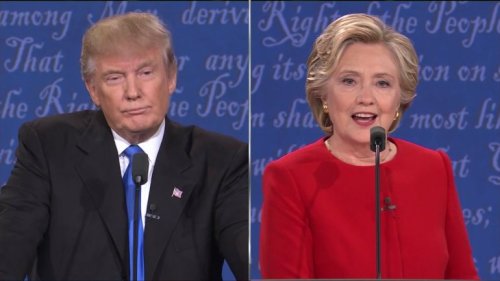
The (hopeful) irony would be that Trump’s electoral collapse not only elects Hillary Clinton president but also returns control of Congress to the Democrats, enabling them to enact a good chunk of the DNC progressive platform negotiated with Bernie Sanders (who was the one seen on the left as the change agent). Rather than merely settling for the status quo, Hillary may be able to strengthen ObamaCare (even add back in the public option where red state governors have crashed the exchanges), make college affordable, build public infrastructure, regulate shadow banking, rebalance the tax code – and with a Senate tie or majority, fill Antonin Scalia’s seat (and other likely upcoming vacancies) with jurists who don’t think the Constitution has been frozen in time s ince 1789. She may also be able to use her considerable social and negotiating skills with Republicans (which were much admired when she served in the Senate and as Secretary of State) to forge some bipartisan compromises, particularly on comprehensive immigration reform and climate change.
ince 1789. She may also be able to use her considerable social and negotiating skills with Republicans (which were much admired when she served in the Senate and as Secretary of State) to forge some bipartisan compromises, particularly on comprehensive immigration reform and climate change.
In other words, Hillary may be able to resume where President Obama left off in 2010 after losing the House in the Tea Party midterms and become the refreshing change we can all believe in

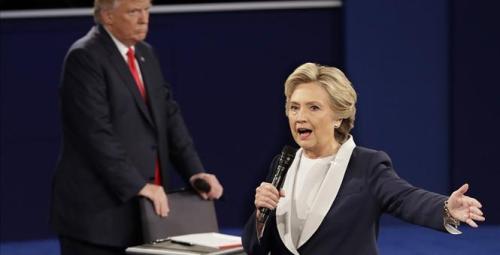
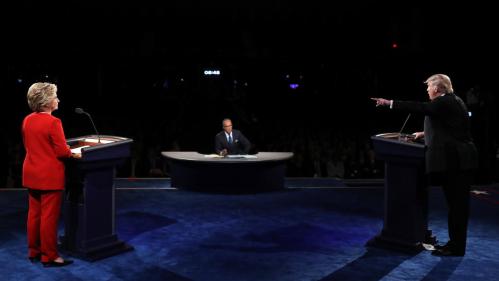
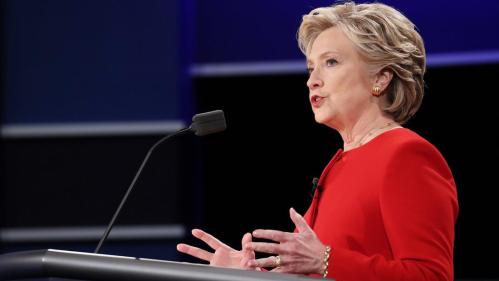 She was even able to humanize income inequality – early on setting the foundation that she is the daughter of a small-town drapery printer. She then recounted how Trump stiffed a multitude of independent contractors at his casinos and properties — and then personally took umbrage on behalf of her father and all small business owners.
She was even able to humanize income inequality – early on setting the foundation that she is the daughter of a small-town drapery printer. She then recounted how Trump stiffed a multitude of independent contractors at his casinos and properties — and then personally took umbrage on behalf of her father and all small business owners.
